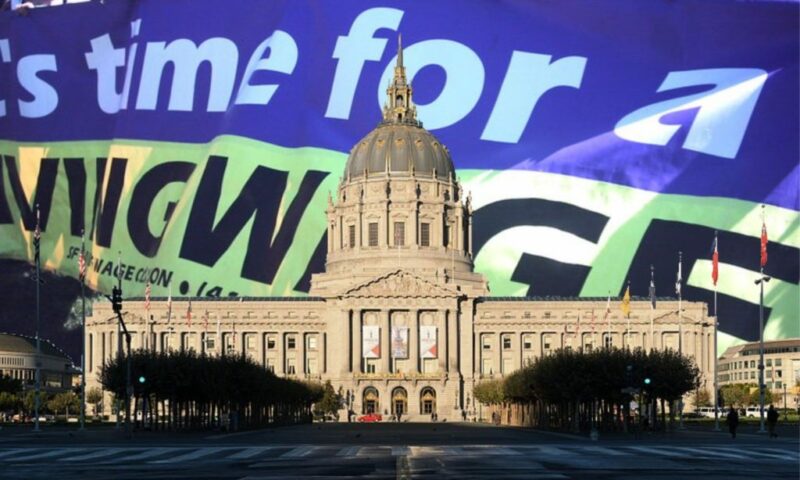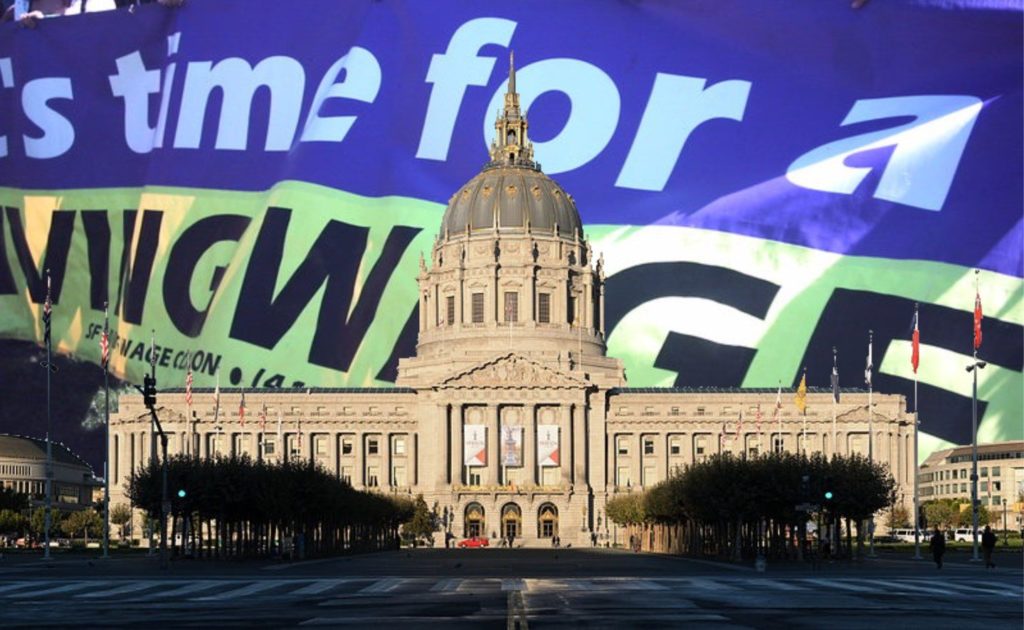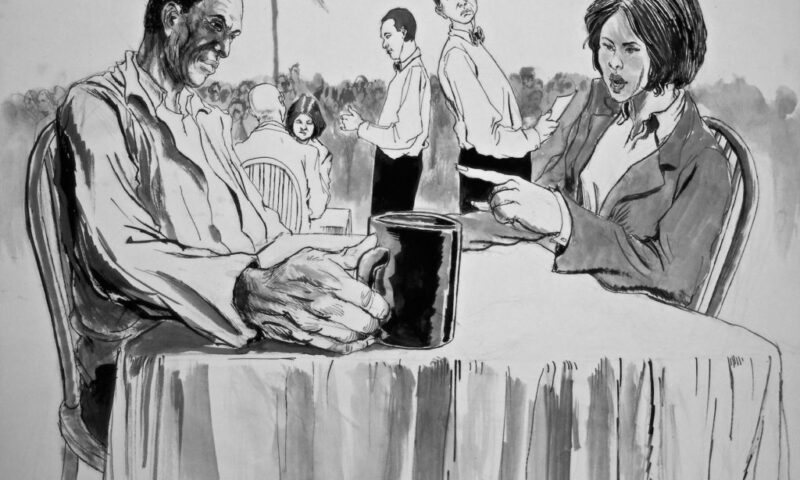

And wisdom is a butterfly
And not a gloomy bird of prey.
— W.B. Yeats
 Artist Eric Drooker’s drawing of an iron worker sitting astride a steel girder looking solemnly at a butterfly is a cool image. (The drawing appeared as a 2009 New Yorker cover.) Judging from the shadows on the buildings, the sun is low in the sky. There is no sweat dripping from a grimy brow. Unlike the socialist-realist paintings of noble workers striding forward or the purposeful energy depicted in WPA murals of the 1930s, the iron worker here is alone and contemplative – sad, even.
Artist Eric Drooker’s drawing of an iron worker sitting astride a steel girder looking solemnly at a butterfly is a cool image. (The drawing appeared as a 2009 New Yorker cover.) Judging from the shadows on the buildings, the sun is low in the sky. There is no sweat dripping from a grimy brow. Unlike the socialist-realist paintings of noble workers striding forward or the purposeful energy depicted in WPA murals of the 1930s, the iron worker here is alone and contemplative – sad, even.
Where are his fellow workers who might provide a release from strenuous labor with a moment of conviviality? The city itself appears quiet. The strutting, tempestuous, scandalous streets of New York do not even attract a glance. This iron worker reminds me of one of Edward Hopper’s lonely figures,



This week California – the state that passed the Three Strikes Law in 1994 – voted 59 to 41 percent in favor of Proposition 47. Proposition 47 will reclassify six non-violent felonies as misdemeanors and redirect the savings in prison spending toward substance abuse treatment, mental health counseling and education.
Is this a movement moment for the long-running campaign to end mass incarceration? There does seem to be a lot of positive activity on the issue. And not just in California.
“Fair Chance Hiring Policies”—also known as “Ban the Box” policies—now cover 70 cities and counties, and 12 states, according to the National Employment Law Project. These policies delay consideration of a person’s conviction history until later in the hiring process, making it easier for those who have felonies on their record to find employment. Big retailers, such as Target, have also banned the box.
» Read more about: What’s Missing from the Movement to End Mass Incarceration? »



Have you ever felt paralyzed by the apocalyptic projections of global warming? Have you walked away from a presentation, article or news report feeling despair about the heating of our planet? You’re not alone. Amongst young Americans polled, global warming is a major worry.
The fear is good and warranted; the despair and paralysis are not. According to Jonathan Parfrey of the L.A.-based nonprofit, Climate Resolve, climate change needs to be seen as a local issue that people can address and do something about. And he has many ideas about how that can be done.
“L.A. has a spectacular climate,” says Parfrey, “we all love it. That’s why we’re here.” But global warming can hurt our city by impacting the things we care most about — including our health, food and water supply, property values, air quality and fire safety.
What’s called the “urban heat island effect” —



On Tuesday San Francisco voters approved by a 77 to 23 percent margin Proposition J, which will increase the city’s minimum wage from the current $10.74 per hour to $12.25 per hour by May 1, 2015. The city’s minimum wage would climb to $13 per hour by July 2016; to $14 per hour by July 2017 and $15 per hour by July 2018.
“Prop. J will provide a much needed raise to $15 per hour for 140,000 of the lowest paid workers in our city,” Gordon Mar, executive director of Jobs with Justice, San Francisco, told Capital & Main. “Prop. J will also raise the bar nationally for minimum wage policies.”
The “Fight for $15” to gain a higher minimum wage for workers began in Seattle, Washington. Voters there, with Socialist Alternative city council member Kshama Sawant spearheading a grassroots movement,
» Read more about: Big Bay Area Victories for Living Wages »


“A lot of people want to make changes but they don’t know where to go,” said Tiesha Speights on the afternoon of Election Day. So Tiesha went to the people, knocking on doors in Long Beach on behalf of Proposition 47, the California ballot initiative written to reduce the penalties for low-level crimes that involve less than $950, from felony levels to misdemeanors. Speights had been hustling block-by-block for the “Yes on 47” campaign for three weeks. Her work and the canvassing efforts of countless others paid off – Prop. 47 would pass handily Tuesday by a 58.5 percent to 41.5 percent margin.
Speights deeply connected with the measure, which permits re-sentencing for those currently serving a prison term for any of the offenses that the initiative reduces to misdemeanors, including forgery, theft, minor drug offenses and shoplifting. Some 10,000 inmates would be eligible to have their sentences reconsidered.
» Read more about: Proposition 47: Winning One Door at a Time »


Juanita Evers and Hank Dixon walked into the Mercado La Paloma on Grand at a little past one in the afternoon. The main building had been a garment factory but was now turned into an open space of mom and pop shops. There was one featuring Oaxacan handmade curios, a sports gear seller and various ethnic-style eateries. The place had been developed by a nonprofit.
“How about over there?” Juanita said, pointing to a stall offering Thai food tucked back in a corner of the expanse.
“Okay by me,” Dixon replied. “I could stand some spicy chow.”
They ordered and sat at a nearby table. He said, “You really think the congresswoman can help us?”
“She’s very interested in what the university does and wants it to do right by her constituents.” Juanita was a field deputy for Congresswoman Karen Nelson, whose district included the Eden Arms where Dixon lived.
» Read more about: The Dixon Family Chronicles: “You Gonna Step Up?” »



There they go again.
Last Saturday, three days before the election, the Los Angeles Times ran a somewhat bewildering piece about Proposition 47, the California state ballot initiative that seeks to de-felonize certain nonviolent crimes that are currently counted toward a convict’s three-strike tally.
“Prop. 47 puts state at center of a national push for sentencing reform,” ran the feature’s headline on the Times’ website. (“Ground Zero for Penal Reform,” was the print version’s more succinct headline.) And, sure enough, for the first 300 words the piece is pretty much a description of Prop. 47, while noting its major funders are philanthropist George Soros and several liberal foundations. Then, however, in the seventh paragraph (a jump page in the print edition), we get what the Times really wants to say:
The coordination by a few wealthy foundations to change public policy represents a legitimate but worrying form of political influence,
» Read more about: L.A. Times’ “Even-Handed” Approach to Prop. 47 »



Halloween is the time of year dedicated to scary stories, and in In the Public Interest report, “Out of Control,” there are 26 frightening and factual tales of how the push for government outsourcing is hurting taxpayers around the country.
You will be horrified by the real-life examples of Americans tricked by privatization, from a nun fighting cancer who was wrongly dumped from food stamps and Medicaid to foster children placed in severely abusive homes. Privatization is something to be feared when our elected officials aren’t carefully protecting the public’s interest.
We work every day to prevent future privatization horror stories from creeping and crawling their way into our democracy. Because just like Chicago, which leased its parking meters for 75 years to a Morgan Stanley-led private consortium, a bad privatization deal can haunt a community for generations.
Show off your Halloween spirit and share this terrifying report on twitter using the hashtag #PrivatizationHorror.
» Read more about: Privatization’s Trick-or-Trick Halloween »


 The chefs over at Labor 411 have come up with a host of Halloween recipes from union-made ingredients. Treats include Mummy Dogs, No-Bake Marshmallow Witches, Rummy Worms, and our favorite, Graveyard Rice Krispies Treats. We’ve included the easy-to-follow recipe below.
The chefs over at Labor 411 have come up with a host of Halloween recipes from union-made ingredients. Treats include Mummy Dogs, No-Bake Marshmallow Witches, Rummy Worms, and our favorite, Graveyard Rice Krispies Treats. We’ve included the easy-to-follow recipe below.
And if you still haven’t purchased treats for tonight’s trick-or-treaters, check out Labor 411’s list of union-made candy!
Graveyard Rice Krispies Treats
Ingredients (purchase from your local unionized grocery store):
4 cups Kraft miniature marshmallows
¼ cup Land O Lakes butter, cubed
6 cups Kellogg’s Rice Krispies cereal
12 Oreos
1 tube white decorating gel frosting
1 can Betty Crocker chocolate frosting
Halloween sprinkles
Instructions:
1. In a large saucepan, combine and stir marshmallows and butter over medium-low heat until melted.



Today Christopher Klein, a U.S. bankruptcy judge, approved the city of Stockton’s plans to exit bankruptcy – ensuring that the pensions of Stockton’s retired public workers will not be subject to a tug of war among the city’s creditors.
“Judge Klein’s decision reinforces the confidence we had in our plan from the beginning,” Stockton City Councilmember Elbert Holman told Capital & Main by phone. Holman, along with Paul Canepa and Kathy Miller, voted to file for Chapter 9 bankruptcy; all three remain in office.
The judge’s Thursday decision had not been a foregone conclusion. On October 1, Klein had ruled that the federal bankruptcy code could trump the state’s retirement law that protects public employees’ defined-benefit pensions – and thus expose these retirement plans for “impairment,” or cuts. This prompted the Sacramento Bee’s political columnist, Dan Walters, to cite a Wall Street source’s favorable response: “Moody’s Investors Service underscored that effect by declaring that Klein’s ruling is ‘welcome news for investors’ in municipal debt.”
Stockton’s experience with bankruptcy – and the shadowy role of Wall Street credit-rating firms —
» Read more about: Judge Keeps Pensions Out of Stockton Bankruptcy Deals »